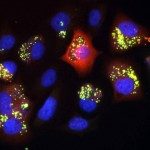Lien vers Pubmed [PMID] – 29312652
Lien DOI – 10.18632/oncotarget.22663
Oncotarget 2017 Dec; 8(65): 109836-109847
Gastrointestinal stromal tumors (GISTs) are rare mesenchymal malignancies of the gastrointestinal tract. Most GISTs harbor a c-KIT (80%) or a PDGFRα (10%) mutation that leads to constitutive activation of the tyrosine kinase receptor. Response to treatment with tyrosine kinase inhibitors (TKIs) is dependent on mutational status of the tumor. The most common mutation in PDGFRα, D842V, is known to be imatinib resistant. Almost all other PDGFRα mutations are imatinib sensitive. We describe two patients with a PDGFRα exon 18 mutated GIST responding to treatment with TKIs. One of these patients has a p.M844_S847 deletion, not previously described in relation with TKI treatment response. Mutations in circulating tumor DNA were detectable with digital droplet PCR in serial plasma samples taken during treatment and correlated with treatment response of both patients. Computer 3D-modeling of the PDGFRα kinase domain of these two variants revealed no direct interference in imatinib or sunitinib binding and no effect in its activity in contrast to the reported structure of the imatinib resistant D842V mutation. An overview is given of the literature regarding the evidence of patients with different PDGFRα mutated GISTs on response to TKIs. The findings emphasize the use of mutational analysis in GIST to provide patients personalized treatment. Detection of mutations in plasma is feasible and can provide real-time information concerning treatment response. We suggest to register GIST patients with these uncommon mutations in a prospective international database to understand the tumor biology and obtain more evidence of such mutations to predict treatment response.

